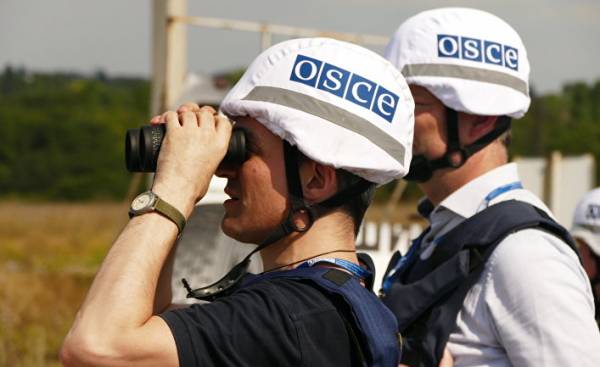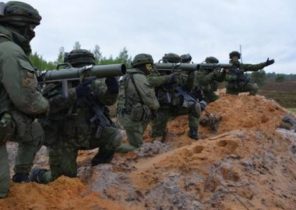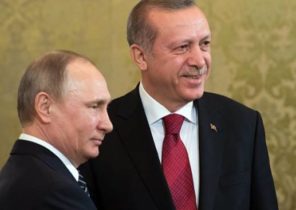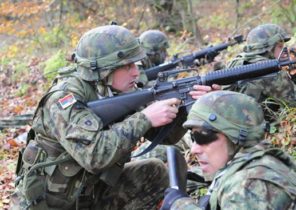
This week, dozens of diplomats and military experts from Europe, North America and the former Soviet Union gathered in the Hofburg castle in Vienna to discuss security issues and to conduct the annual analysis of the situation with arms control and confidence-building measures in the Euro-Atlantic region.
On 11 July the foreign Ministers of the 57 member States of OSCE gathered at an informal meeting in the Austrian Mauerbach to discuss the current security threats. In addition to the current conflicts in the OSCE region on the agenda are migration, terrorism and infringement of human rights, rule of law and democracy.
These meetings are in a difficult and decisive moment for European security. The return of geopolitics calls into question emerged after the cold war model of cooperation and inter-state relations in the first place is increasingly coming zero-sum game. Polarization is gaining momentum, mutual trust is melting, and the situation in the military sphere is becoming increasingly unpredictable, leading to increasing tensions in our geographical area.
The diverging perceptions of threats exacerbate these negative trends. The expansion of NATO and the European Union is perceived by Moscow as a destabilizing factor or even a threat. In response, Russia increased investment in defense and increased its military exercises. The escalation increases a growing number of dangerous incidents with the convergence of military aircraft and ships.
The risk of escalation
In such an atmosphere of uncertainty and unpredictability we are likely to tighten in the cycle of escalation, which is fraught with confrontation. It is this dynamics works in the Ukrainian crisis: a completely different perception of the conflict and its causes exacerbate distrust and tension while the air pressure in favor of the security solutions is becoming stronger.
The crisis has undermined the foundations of the established post-cold war security system and has raised doubts about the strength of the rules-based regime of relations between our countries. Progress in the implementation of the Minsk agreements are not satisfactory, and in recent months we have witnessed the rise of tensions in the Donbass amid constant risk of escalation.
What can we do to restore the atmosphere of stability and security in Europe? During the cold war parity between military units has been a key concept for the maintenance of strategic stability in the CSCE/OSCE monitored the ratio of conventional forces of the two units in different categories of military equipment like combat aircraft and helicopters, and also regulate their numbers and territorial distribution.
Was developed a complex system of rules to regulate military activities, to provide transparency and predictability to build trust and to avoid discrepancies in the perception of the situation. This quantitative approach was largely based on the principle of symmetry. The fact that symmetry is an essential condition of equilibrium.
Perception and reality
In the current climate of the increasingly acute shortage of trust, we see that the measures of relationship security are rapidly becoming more ineffective.
In our multipolar world, neither of which symmetry more is not the question: the old blocks have disappeared or have undergone a major transformation, the nature of conflicts has changed, and military technology is evolving rapidly, and on the background of the obsolescence of past agreements the dominant mentality of zero-sum game becomes an obstacle to reforms of the regulatory instruments of our relations in the security sphere.
More than ever, we need to try to restore strategic stability. You need to make the asymmetry of force, military activities and the deployment of troops and army itself does not become a destabilizing factor.
Now it’s time to adopt the logic of “asymmetrical stability”. In the current security situation in Europe, esse est percipi: the perception so much influence on the reality that in some way become her. We need broad thinking to develop approaches that will allow to consider simultaneously the differences of perceptions and military asymmetries in our privacy policy. We need to develop new tools that we have at the moment, fail.
How would they look like? They should lead to risk reduction in a practical manner and with careful attention to the concerns of all parties involved, and their formation should be carried out together. They should be based on the principles of predictability and transparency, as well as the perception of threats and other qualitative and political considerations, as well as a quantitative component.
Asymmetrical stability
For example, it would be possible to impose restrictions on Russian military exercises near the borders of some neighbouring countries and in particular the Baltic republics, as well as to achieve greater transparency in these exercises on a given space as a whole. In response, Moscow could get information about the NATO forces, their deployment and activities in the region.
It is possible to introduce a system of mutual surveillance, albeit on a smaller scale. The procedure for the exchange of data about the movements of troops and equipment in some regions like the Baltic and the Black sea could reduce tensions and the risk of incidents. You should also consider the mechanism of cooperation with providing immediate consultation and measures to defuse tensions in the event of a military incident or threat convergence.
But how can you introduce the factor of “perception” in our strategy? Is it possible to find balance in asymmetry? Whether really to come to broader views, accepting our differences and finding a way to incorporate them in a new security system? Will we be guided by the logic of “asymmetrical stability”?
Just a few of those questions that will have to find the answer diplomats and military experts. I hope they will be able to overcome differences and solve problems in a pragmatic manner, to strengthen our stability and security.
Lamberto Zannier, the Ambassador of Italy, former OSCE Secretary General from 2011 to 2017.







